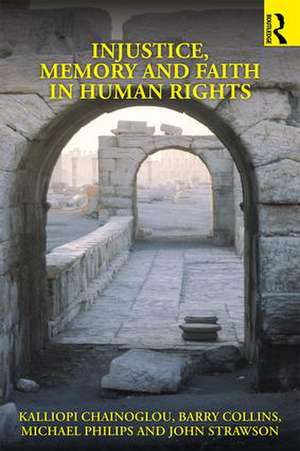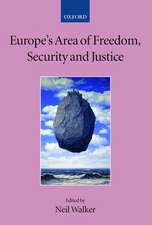Injustice, Memory and Faith in Human Rights
Editat de Kalliopi Chainoglou, Barry Collins, Michael Phillips, John Strawsonen Limba Engleză Hardback – 21 iul 2017
| Toate formatele și edițiile | Preț | Express |
|---|---|---|
| Paperback (1) | 416.22 lei 6-8 săpt. | |
| Taylor & Francis – 11 apr 2019 | 416.22 lei 6-8 săpt. | |
| Hardback (1) | 1002.63 lei 6-8 săpt. | |
| Taylor & Francis – 21 iul 2017 | 1002.63 lei 6-8 săpt. |
Preț: 1002.63 lei
Preț vechi: 1222.73 lei
-18% Nou
Puncte Express: 1504
Preț estimativ în valută:
191.85€ • 201.03$ • 158.60£
191.85€ • 201.03$ • 158.60£
Carte tipărită la comandă
Livrare economică 11-25 aprilie
Preluare comenzi: 021 569.72.76
Specificații
ISBN-13: 9781472462329
ISBN-10: 1472462327
Pagini: 242
Ilustrații: 3
Dimensiuni: 156 x 234 x 20 mm
Greutate: 0.52 kg
Ediția:1
Editura: Taylor & Francis
Colecția Routledge
Locul publicării:Oxford, United Kingdom
ISBN-10: 1472462327
Pagini: 242
Ilustrații: 3
Dimensiuni: 156 x 234 x 20 mm
Greutate: 0.52 kg
Ediția:1
Editura: Taylor & Francis
Colecția Routledge
Locul publicării:Oxford, United Kingdom
Cuprins
Contents.
Acknowledgements
Contributors
Introduction
Kalliopi Chainoglou, Barry Collins, Michael Phillips and John Strawson
Part I. Moments of Memory and Injustice
Chapter 1. Ghosts of War Crimes Past: An account from the frontline in Bangladesh, Wayne Morrison.
Chapter 2. Modern Islamic Memory and the ISIS ‘Caliphate,’ John Strawson.
Chapter 3. Peace and Reconciliation in Northern Ireland: The case of Irish nationalism, Cillian McGrattan.
Chapter 4. Selecting the Memory, Controlling the Myth: The propaganda of legal foundations in early modern drama, Eric Heinze.
Chapter 5. Sin Carries the Penance: the Spanish Civil War's conflicts of guilt and justice, Ignacio Fernandez de Mata
Part II. Addressing Injustice
Chapter 6. Beginning Anew: Exceptional Institutions and the Politics of Ritual, Paul Muldoon
Chapter 7. Promoting Reconciliation and Protecting Human Rights: an underdeveloped relationship, Nasia Hadjigeorgiou.
Chapter 8. Human Rights as Acts of Faith: Universal Jurisdiction and the Law of Historical Memory in Spain, Barry Collins.
Chapter 9. The Right to Historical Truth and Historical Memory versus Historical revisionism and denialism: A human rights analysis, Kalliopi Chainoglou
Part III. Questions of Faith
Chapter 10. Misplaced Faith? Implementing Spain's 2007 Reparations Law, Georgina Blakeley.
Chapter 11. Faith, Justice and Catholic Public Memory: The Politics of Reconciliation in Australia and New Zealand, Dominic O’Sullivan.
Chapter 12. A Pastoral Care for Reconciliation? Spanish Catholic Bishops and historical memory during the Zapatero Era (2004–2011), Mireno Berrettini
Chapter 13. The Australian Christian Churches and the Aboriginal Reconciliation Process: public religion and its limitations, Michael Phillips.
Conclusion: Varosha: a memorial to conflict, Mertkan Hamit and John Strawson.
Index
Acknowledgements
Contributors
Introduction
Kalliopi Chainoglou, Barry Collins, Michael Phillips and John Strawson
Part I. Moments of Memory and Injustice
Chapter 1. Ghosts of War Crimes Past: An account from the frontline in Bangladesh, Wayne Morrison.
Chapter 2. Modern Islamic Memory and the ISIS ‘Caliphate,’ John Strawson.
Chapter 3. Peace and Reconciliation in Northern Ireland: The case of Irish nationalism, Cillian McGrattan.
Chapter 4. Selecting the Memory, Controlling the Myth: The propaganda of legal foundations in early modern drama, Eric Heinze.
Chapter 5. Sin Carries the Penance: the Spanish Civil War's conflicts of guilt and justice, Ignacio Fernandez de Mata
Part II. Addressing Injustice
Chapter 6. Beginning Anew: Exceptional Institutions and the Politics of Ritual, Paul Muldoon
Chapter 7. Promoting Reconciliation and Protecting Human Rights: an underdeveloped relationship, Nasia Hadjigeorgiou.
Chapter 8. Human Rights as Acts of Faith: Universal Jurisdiction and the Law of Historical Memory in Spain, Barry Collins.
Chapter 9. The Right to Historical Truth and Historical Memory versus Historical revisionism and denialism: A human rights analysis, Kalliopi Chainoglou
Part III. Questions of Faith
Chapter 10. Misplaced Faith? Implementing Spain's 2007 Reparations Law, Georgina Blakeley.
Chapter 11. Faith, Justice and Catholic Public Memory: The Politics of Reconciliation in Australia and New Zealand, Dominic O’Sullivan.
Chapter 12. A Pastoral Care for Reconciliation? Spanish Catholic Bishops and historical memory during the Zapatero Era (2004–2011), Mireno Berrettini
Chapter 13. The Australian Christian Churches and the Aboriginal Reconciliation Process: public religion and its limitations, Michael Phillips.
Conclusion: Varosha: a memorial to conflict, Mertkan Hamit and John Strawson.
Index
Notă biografică
Kalliopi Chainoglou is a Lecturer in International and European Institutions at the University of Macedonia, Thessaloniki (Greece) and visiting Research Fellow at the Centre on Human Rights in Conflict, at the University of East London. She completed her PhD in International Law at King’s College London and is an Associate Fellow of the British Higher Education Academy. She works in the areas of human rights law, cultural rights and policies, and international peace and security. She is an expert of the Council of Europe/ERICarts Compendium of Cultural Policies and Trends in Europe and has published extensively on human rights and international law. Her most recent publication is Culture and Human Rights: The Wroclaw Commentaries (de Gruyter, 2016).
Barry Collins is a Senior Lecturer at University of East London, where he is a member of the Centre on Human Rights in Conflict. His research deals with themes of legal theory, international law, human rights and memory in post-conflict societies, with a particular focus on Ireland and the Middle East.
Michael Phillips is a banking lawyer and independent researcher. He has had an interest in the relationship between religion, politics and transitional justice since doing his PhD on the Aboriginal reconciliation process at the University of Sydney. He was formerly Senior Lecturer in Law at the University of East London.
John Strawson is honorary Professor of Law at the University of East London where he is a member of the Centre on Human Rights in Conflict and a fellow of the Terrorism and Extremism Research Centre. He works in the areas Law and Middle East Studies focusing on colonial legal history and Islamic law. His publications include Partitioning Palestine: Legal Fundamentalism in the Palestinian–Israeli Conflict (2010) and he is the editor of Law after Ground Zero, re-issued in hardback by Routledge in 2016.
Barry Collins is a Senior Lecturer at University of East London, where he is a member of the Centre on Human Rights in Conflict. His research deals with themes of legal theory, international law, human rights and memory in post-conflict societies, with a particular focus on Ireland and the Middle East.
Michael Phillips is a banking lawyer and independent researcher. He has had an interest in the relationship between religion, politics and transitional justice since doing his PhD on the Aboriginal reconciliation process at the University of Sydney. He was formerly Senior Lecturer in Law at the University of East London.
John Strawson is honorary Professor of Law at the University of East London where he is a member of the Centre on Human Rights in Conflict and a fellow of the Terrorism and Extremism Research Centre. He works in the areas Law and Middle East Studies focusing on colonial legal history and Islamic law. His publications include Partitioning Palestine: Legal Fundamentalism in the Palestinian–Israeli Conflict (2010) and he is the editor of Law after Ground Zero, re-issued in hardback by Routledge in 2016.
Recenzii
Ruminating on the relationship between law, memory, and human rights, this impressive collection dazzles in content and scope. Its empirically rich and theoretically provocative contributions range from international law to literary studies, crossing an expanse of geographies and histories, all to remind readers that while wrongs cannot be righted, and memory cannot be trusted, the pursuit of justice in the present cannot be abandoned. A valuable collection for scholars - legal and otherwise - working in the areas of transitional justice, de-colonization, reconciliation, and public memory.
Stacy Douglas, Assistant Professor of Law and Legal Studies, Carleton University, Ottawa, Canada
Stacy Douglas, Assistant Professor of Law and Legal Studies, Carleton University, Ottawa, Canada
Descriere
This multi-disciplinary collection interrogates the role of human rights in addressing past injustices. The volume draws on legal scholars, political scientists, anthropologists and political philosophers grappling with the weight of the memory of historical injustices arising from conflicts in Europe, the Middle East and Australasia. It examines the role of human rights as legal doctrine, rhetoric and policy as developed by states, international organizations, regional organizations, and non-governmental organizations.












